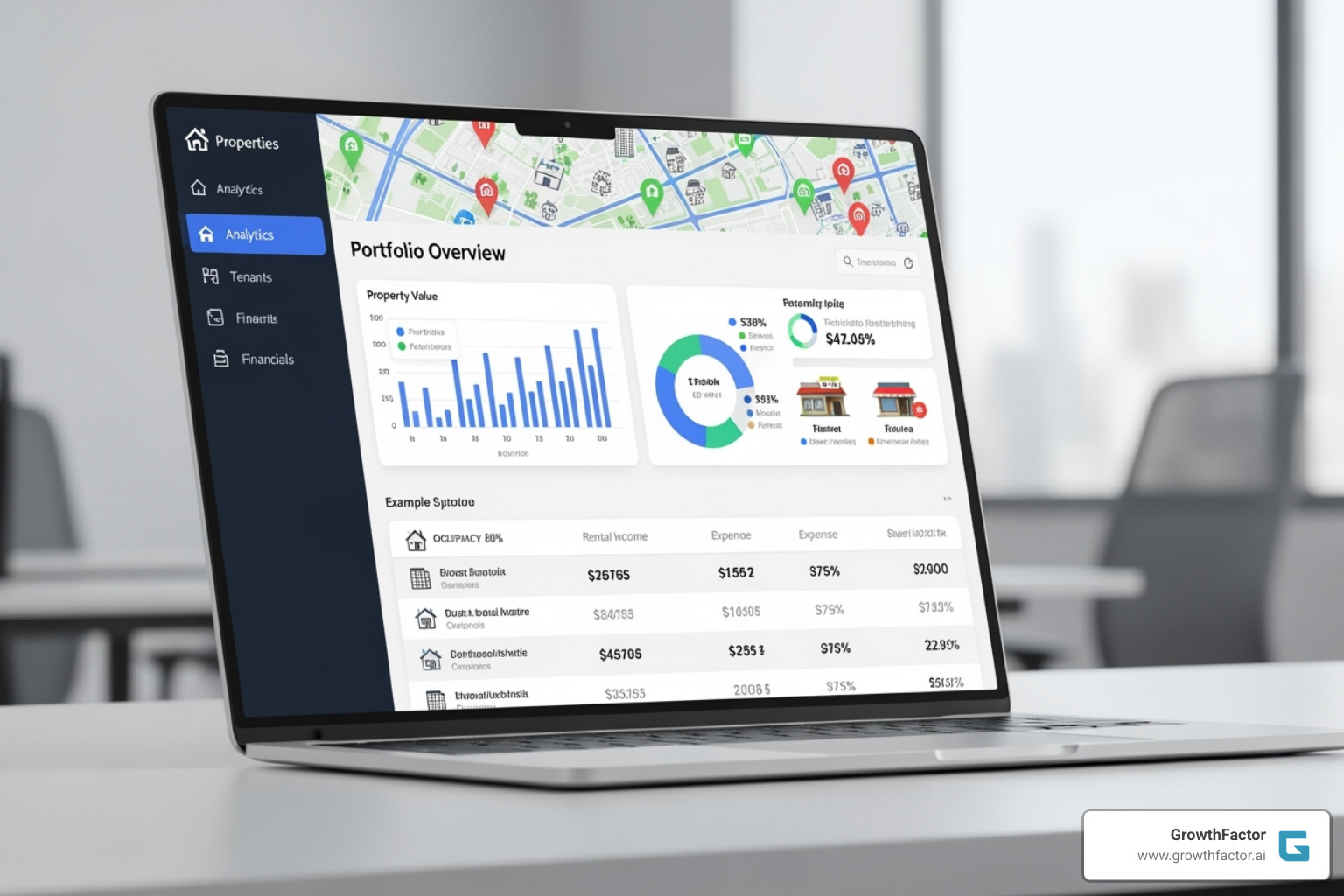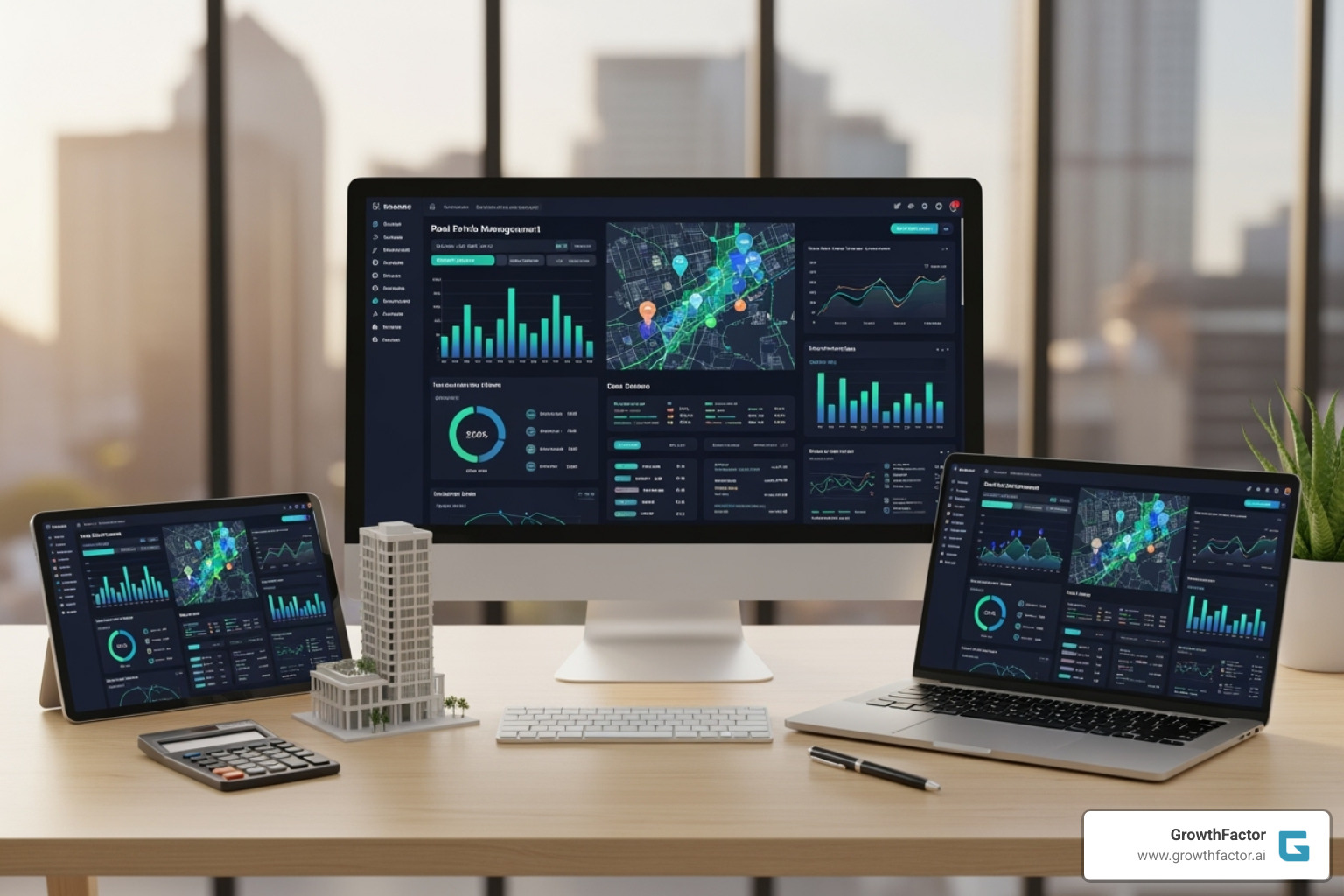From Tracking to Triumph: Your Guide to Real Estate Portfolio Software
Why Modern Portfolio Management Demands Integrated Software Solutions

Real estate portfolio management software replaces inefficient spreadsheets and disparate systems by centralizing property data, automating financial processes, and streamlining investor relations on a single platform. This shift prevents the operational bottlenecks that slow down growth.
Key Software Categories for Real Estate Portfolio Management:
- Investment Management Platforms - Handle fundraising, investor relations, and deal tracking.
- Asset Management Solutions - Focus on property operations, lease management, and performance analytics.
- Site Selection & Development Tools - Specialize in location analysis and feasibility studies.
- All-in-One Retail Platforms - Combine portfolio management with AI-powered site selection for growing brands.
The move to integrated platforms is about survival in a competitive market. Firms using comprehensive software report faster fundraising cycles, an improved professional image, and the ability to scale with less overhead. As one real estate professional noted: "We went from manual to modern, changing how we operate and delivering reports on time, improving our client satisfaction significantly."
Without integrated software, growing portfolios face lost deals from slow evaluations, investor frustration from delayed reporting, and teams overwhelmed by manual data entry. The most successful firms recognize this software as a strategic investment, not just an operational tool.
I'm Clyde Christian Anderson, CEO of GrowthFactor.ai, where we've helped retailers evaluate over 800 locations in 72 hours during major bankruptcy auctions, opening up $1.6M in cash flow through faster decision-making. My experience building real estate portfolio management software for growing retail brands has shown me how the right platform transforms reactive tracking into proactive, strategic growth.
Simple guide to real estate portfolio management software:
What Are the Core Features of Modern Portfolio Software?

Modern real estate portfolio management software has evolved far beyond scattered spreadsheets. Today's platforms are comprehensive ecosystems that provide a complete, centralized view of your investments. Think of it as a mission control center where you can manage, grow, and optimize your portfolio, changing your entire approach to investment oversight.
Key Financial Management Tools
Modern software simplifies complex financial management. Automated bookkeeping connects to bank accounts and systems like QuickBooks, automatically categorizing transactions and storing digital receipts. This eliminates tedious manual reconciliation.
Waterfall distribution calculations become effortless. The system handles complex payment structures for multiple investor tiers, ensuring timely and accurate returns without the risk of mathematical errors that could damage relationships.
Powerful budgeting and forecasting capabilities allow you to create detailed budgets, compare actuals against projections, and forecast future cash flows with confidence. This supports strategic planning and helps guide investment decisions.
Financial reporting is streamlined with comprehensive, customizable reports like income statements, cash flow analyses, and schedules of real estate owned. These are suitable for internal analysis, investor updates, and tax preparation.
For multi-tenant portfolios, lease management features track lease terms, renewals, rent escalations, and compliance requirements, ensuring you never miss a critical date.
Investor Relations and Fundraising
Maintaining investor confidence requires transparency and professionalism. Modern platforms provide investor portals with 24/7 access to investment data, documents like K-1s, and performance reports. Built-in CRM capabilities help you manage relationships strategically by tracking communications and segmenting contacts for targeted updates.
Capital call automation and subscription processing transform fundraising into a smooth, professional experience. We've seen subscription document completion times drop to just 8-10 minutes. Secure document sharing and e-signatures eliminate paperwork and speed up deal closings, all within a secure platform.
Operations and Asset Management
A rock-solid operational backbone starts with a centralized data repository, creating a single source of truth for all property information. This eliminates data discrepancies among team members.
Maintenance tracking manages work orders and monitors expenses to keep properties in top condition, while compliance management helps you steer regulations efficiently. Performance dashboards offer real-time insights into key metrics like occupancy rates and revenue, allowing you to spot trends and address issues proactively.
The best platforms also include comprehensive portfolio property management features. At GrowthFactor, we improve this by automating the qualification and evaluation processes for retail sites, helping teams evaluate five times more opportunities efficiently.
Key operational features that make the biggest difference:
- Centralized property data and rent roll management
- Automated lease tracking and tenant communication
- Real-time performance monitoring across all assets
- Integrated maintenance and compliance workflows
- Customizable reporting for different stakeholder needs
This comprehensive approach lets your team focus on strategy and growth instead of administrative tasks.
How Software Drives Efficiency, Scalability, and Growth

Adopting an integrated system is a strategic move to build a more resilient, scalable, and profitable real estate business. Real estate portfolio management software transforms how you operate, driving significant growth and efficiency.
Streamlining Operations and Reducing Overhead
Modern software automates tedious, error-prone tasks like data entry and routine reporting. This frees up hundreds of hours annually, allowing your team to focus on high-value activities like deal sourcing and investor relations. By eliminating manual work, you drastically reduce financial and reporting errors, building trust through accuracy.
A centralized platform creates a "single source of truth," ensuring every team member works with the same correct information. This improves collaboration and accelerates decision-making. The biggest advantage is the ability to scale your business without proportionally increasing headcount. By automating key processes, you can manage more properties and investors with your existing team, significantly reducing overhead.
Enhancing Professional Image and Investor Confidence
Your professional image and investor trust are invaluable assets. This software helps you excel by generating professional, polished reports that are clear, concise, and visually appealing, replacing clunky spreadsheets.
A secure investor portal offering 24/7 access to information demonstrates transparency and professionalism, building deep trust. Customers consistently report that these portals improve their company's image. Streamlined communication tools, such as automated updates, keep investors informed and show you are proactive, with some firms cutting communication efforts by 50-75%.
Efficient processes make fundraising faster and less stressful. A smooth, professional experience encourages repeat investments and referrals, allowing you to capitalize on new opportunities quickly. These benefits lead to improved client satisfaction, turning investors into loyal partners and advocates for your business.
Leveraging Data and AI in Real Estate Portfolio Management Software

The true power of modern platforms lies in their ability to transform raw data into actionable intelligence, giving firms a significant competitive edge. This means moving from simply storing information to understanding what it means for your business.
Achieving Portfolio-Wide Visibility
Modern real estate portfolio management software excels at data aggregation, acting as a central hub that pulls information from disparate sources into a unified view. This eliminates the need to jump between systems to gauge performance. With real-time analytics, you are no longer working with outdated numbers; you see market shifts, payments, and expenses as they happen, enabling a rapid response to opportunities and challenges.
Customizable dashboards adapt to your workflow, displaying the Key Performance Indicators (KPIs) that matter most to your role, from cash flow to occupancy rates. This creates a holistic portfolio view, providing the confidence to see how individual properties contribute to overall performance, identify top assets, and spot potential issues before they escalate.
Enabling Smarter, Data-Driven Decisions
Artificial intelligence transforms educated guesses into informed strategy. AI for asset managers improves human judgment, providing the tools to analyze information faster and more accurately.
Predictive analytics help forecast future events, such as tenant default risks or emerging market trends. AI-powered market trend analysis can process thousands of data points—like foot traffic, demographics, and economic indicators—that would take a team months to review manually. This is especially critical for retail real estate.
Site selection tools are one of the most exciting applications of AI. At GrowthFactor, our AI Agent Waldo evaluates five times more sites than traditional methods, allowing teams to assess dozens of locations quickly and focus on the most promising ones. AI also improves risk assessment by flagging potential issues and enables sophisticated real estate portfolio optimization by modeling various "what-if" scenarios with real data.
Furthermore, AI-powered underwriting revolutionizes deal evaluation, generating estimates in hours instead of weeks. This speed provides a competitive advantage, allowing you to pursue more opportunities and make offers while others are still crunching numbers.
How to Choose the Right Platform for Your Needs
Choosing the right real estate portfolio management software is a critical decision. The goal is to select a platform that fits your unique portfolio, streamlines operations, and supports your growth ambitions. Here’s how to make a smart choice.
Matching Software to Your Portfolio Type
The best software is not a one-size-fits-all solution; it depends on the type of real estate you manage. The table below highlights key features for different portfolio types:
| Portfolio Type | Key Software Considerations |
|---|---|
| Commercial | Advanced lease management, detailed expense tracking, multi-tenant capabilities, robust reporting for various property types (office, retail, industrial). |
| Retail | Strong site selection and deal tracking, AI-powered market analysis, tenant mix optimization, sales forecasting, integration with foot traffic data. (This is our specialty at GrowthFactor!) |
| Multifamily | Tenant management, online rent collection, maintenance tracking, resident communication tools, vacancy management, comprehensive financial reporting per unit/building. |
| Industrial | Space utilization analysis, logistics management, high-volume lease tracking, specialized reporting for large-scale operations. |
| Mixed-use | Flexibility to handle diverse property types within a single asset, complex financial modeling, integrated management of residential, commercial, and retail components. |
| Debt Funds | Debt management for borrowers and investors, loan portfolio management, interest calculation, compliance tracking for lending activities. |
| Syndications | Robust investor portals, capital call automation, secure document sharing, e-signatures, waterfall distribution calculations, CRM for managing many limited partners. |
At GrowthFactor, we specialize in the retail real estate industry. Our platform is built to address the unique challenges of this sector, from site selection and tenant mix optimization to market performance predictions.
Evaluating Real Estate Portfolio Management Software Providers
Once you know your needs, evaluate providers as long-term partners. Look for a team committed to your success.
Integration Capabilities: The platform must connect seamlessly with your existing tools, like accounting software (e.g., QuickBooks) and CRMs. Flexible API access is crucial for creating a "single source of truth," saving time and preventing errors.
Onboarding and Training: A smooth transition is vital. Look for providers offering a dedicated team for data migration and comprehensive training resources like webinars and coaching. The goal should be to see real-time results within 30 days.
Customer Support Model: Long-term success depends on responsive, knowledgeable support that feels like an extension of your team. A great partner demonstrates continuous innovation and commitment to your growth.
Data Security Protocols: Your data's safety is non-negotiable. Ensure the provider uses strong security measures like two-factor authentication (2FA), end-to-end encryption, and regular security audits.
Scalability and AI Tools: The solution must grow with you, handling an expanding portfolio without performance issues. Prioritize platforms with AI Property Management Tools for data analysis, predictive trends, and automation. Our AI Agent Waldo is a key differentiator, designed to maximize efficiency in site evaluation.
Flexible pricing is also important. We offer plans for various business sizes, including Core ($500), Growth ($1,500), and custom Enterprise options.
Frequently Asked Questions about Real Estate Portfolio Software
It's natural to have questions when considering a move to real estate portfolio management software. Here are answers to the most common concerns we hear from real estate professionals.
How does this software specifically help with fundraising and investor management?
One of the most dramatic benefits is improved fundraising efficiency. The software provides customizable deal rooms for potential investors and automated subscription workflows that cut document completion time to as little as 8-10 minutes. Integrated e-signatures eliminate the need to print, sign, and scan documents.
For ongoing investor management, a centralized CRM tracks every interaction, while secure investor portals provide investors 24/7 access to performance data, documents like K-1s, and transaction histories. Finally, automated distribution calculations ensure investors receive accurate, timely payments, building the trust that leads to repeat investments and referrals.
What is the advantage of an integrated platform versus using separate tools for CRM, accounting, and reporting?
Using separate tools leads to wasted time and errors from re-entering data across systems. An integrated platform creates a single source of truth where information flows seamlessly from one function to the next. A new deal automatically updates financial projections, investor communications, and performance dashboards without manual entry.
This holistic view is invaluable for strategic decision-making, allowing you to see how individual assets impact overall portfolio returns. The time savings are significant, with many clients cutting administrative workloads by 50-75%, freeing them to focus on sourcing deals and serving investors.
What kind of support and training should I expect from a software provider?
Successful implementation is a partnership. Expect a dedicated onboarding team to handle data migration securely and efficiently, with the goal of delivering real-time results within 30 days. Comprehensive training resources, including webinars, tutorials, and hands-on coaching custom to your workflow, are essential.
Ongoing customer service is crucial for long-term success. Look for responsive support that feels like an extension of your team. The best providers offer continuous innovation and platform updates based on user feedback. At GrowthFactor, we act as true technology partners, using tools like our AI Agent Waldo to help retail real estate teams overcome their unique challenges and succeed.
Conclusion: From Data Overload to Strategic Triumph
Real estate portfolio management has evolved beyond spreadsheets and disparate systems. Today, success hinges on smart, integrated solutions. Adopting the right real estate portfolio management software is a changeal change, shifting your operations from reactive tracking to proactive, strategic management. As the broader PropTech movement demonstrates, technology is reshaping every facet of real estate investing.
By centralizing data, automating routine tasks, and leveraging powerful AI insights, you can significantly boost efficiency, strengthen investor relationships, and scale your portfolio with confidence. This strategic shift opens up new levels of performance and profitability.
Platforms like GrowthFactor, with specialized tools like our AI agents for retail site selection, exemplify this modern approach. It's about working smarter, not just harder.
Ready to see how an AI-improved platform can revolutionize your portfolio strategy? Explore our solutions for real estate portfolio managers and let's turn data overload into strategic triumph together.
Citations
The human algorithm
Ready to see what we're cooking?
Submit your information below and we'll be in touch to schedule.


